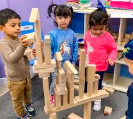Fine motor skills are the foundation for many essential tasks in a young child’s life—from buttoning a shirt to holding a pencil. These small but mighty movements involving the hands, fingers, and wrists play a crucial role in early development. One of the most effective and enjoyable ways to support fine motor growth is through play.
What Are Fine Motor Skills?
Fine motor skills involve the coordination of small muscles in the hands and fingers. These skills help children perform everyday actions like grasping toys, feeding themselves, drawing, and writing. They also contribute to independence and confidence as children begin to explore and interact with the world around them.
The Power of Play in Skill Development
Play is more than just fun—it’s a vital part of learning. Through hands-on activities, children practice precision, strengthen muscles, and improve hand-eye coordination. Unlike structured tasks, play encourages natural curiosity and creativity, which helps keep young learners engaged and motivated.
Playful Activities That Boost Fine Motor Skills
1. Building with Blocks:
Stacking and arranging blocks help children develop control and grip. Whether using wooden blocks or interlocking plastic ones, these activities refine hand coordination.
2. Art and Craft Projects:
Cutting with safety scissors, coloring with crayons, or molding clay all challenge children to use different muscles in their hands. Art encourages both creativity and fine motor precision.
3. Puzzles and Peg Boards:
Fitting pieces into place or manipulating small objects like pegs helps children practice grasping, turning, and placing—important movements for tasks like writing or buttoning.
4. Threading and Beading:
Stringing beads onto yarn or lacing cards can improve focus and hand control. These activities also support visual tracking, which is helpful for reading development.
5. Outdoor Play:
Drawing with chalk, digging in sand, or picking up small natural objects like stones or leaves encourages muscle use in a fun, open setting.
Encouraging Skill Growth at Home and School
Parents, caregivers, and teachers can support fine motor development by offering a variety of age-appropriate play options. It’s important to let children take the lead—choosing what interests them and allowing time for practice without pressure. Gentle guidance and praise go a long way in building confidence and skill.
Final Thoughts
Developing fine motor skills through play helps children grow in more ways than one. It supports school readiness, builds independence, and enhances creativity. By turning everyday moments into playful opportunities, adults can nurture these important abilities with joy and ease.














